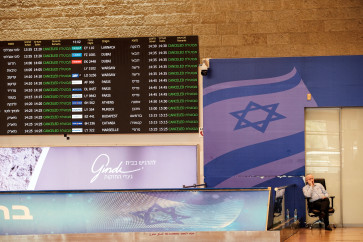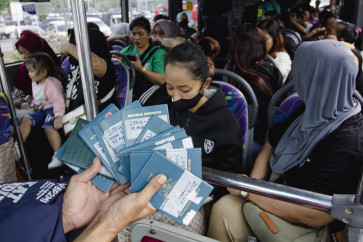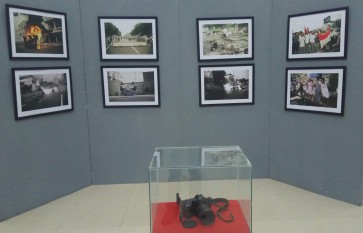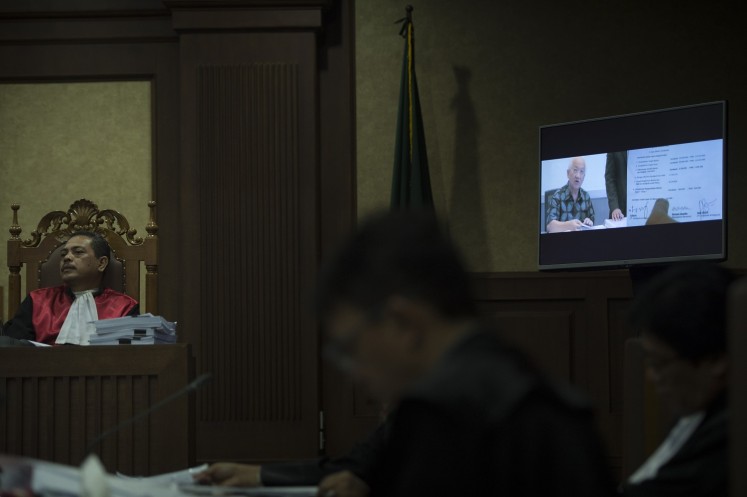Popular Reads
Top Results
Can't find what you're looking for?
View all search resultsPopular Reads
Top Results
Can't find what you're looking for?
View all search resultsBeef businesses agree to cut long supply chain
Price check: Newly appointed Trade Minister Enggartiasto Lukita (second right) and property firm Sinar Mas Land managing director Dhony Rahajoe (right) speak with fish vendors at the Pasar Modern BSD, South Tangerang, Banten, on Sunday
Change text size
Gift Premium Articles
to Anyone

P
/span>
Price check: Newly appointed Trade Minister Enggartiasto Lukita (second right) and property firm Sinar Mas Land managing director Dhony Rahajoe (right) speak with fish vendors at the Pasar Modern BSD, South Tangerang, Banten, on Sunday. Enggartiasto visited the market in an effort to monitor the stability of staple food prices. (JP/Donny Fernando)
Local cattle breeders and feedlots have agreed to team up to cut the industry’s notoriously lengthy supply chain, which often results in high beef prices for consumers.
Newly inaugurated Trade Minister Enggartiasto Lukita said big industry players would buy cattle directly from local producers in rural areas in an attempt to cut out the many middlemen between breeders and consumers, which can consist of six to seven “stopping points”.
“To shorten the supply chain and stabilize prices, we want to see big industry players buy cattle directly from local players in rural areas,” Enggartiasto said after a meeting with representatives of the Indonesian Meat Producers and Feedlot Association (Apfindo), the National Meat Processors Association (Nampa) and the Indonesian Beef Cattle Businesses Association (Gapuspindo), on Sunday in Tangerang.
Feedlot companies will grow the parent stock and give the calves to local breeders to be fattened up over a four-month period. The breeders will then resell the cattle to the companies before they are distributed to sellers in big cities across the country, he added.
With the partnership, all feedlot operators, including PT Tanjung Unggul Mandiri (TUM) in Tangerang, are expected to provide guarantees for local cattle breeders to secure bank loans to help them grow their businesses.
Indonesia’s beef supply chain issues have been in the spotlight recently after beef prices soared to
Rp 140,000 (US$10.64) per kilogram during Ramadhan, far higher than the government’s target of Rp 80,000 per kg, due to the late issuance of import licenses at the beginning of the year that resulted in beef shortages.
Many feedlot companies appeared to have deliberately hoarded supplies to fix prices, with the Business Competition Supervisory Commission (KPPU) recently fining 32 feedlot firms a total of Rp 107 billion for price-fixing and withholding supplies from the market in Greater Jakarta during the 2012-2015 period.
To eradicate the feedlot mafia countrywide, the Trade Ministry has agreed to exchange data and information, as well as teaming up with the Agriculture Ministry, Investment Coordinating Board (BKPM), customs and excise director general Heru Pambudi, KPPU head Muhammad Syarkawi and National Police chief Gen. Tito Karnavian.
“We will closely monitor the mafia and help to stabilize prices by securing the supply chain of food,” Tito said.
Meanwhile, Gapuspindo welcomed the feedlot-cattle breeder partnership idea, as a similar practice was implemented a few years ago, when the Australian government banned live cattle exports to Indonesia in 2011.
Indonesia has become the largest importer of Australian live cattle, with total imports standing at 523,675 head of cattle last year, worth up to $357.6 million, according to the Geneva-based International Trade Center (ITC).
“The problem is the supply figure of local cattle is yet to be clarified. Then if we can’t find enough domestic supply, it could lead to a massive hike in beef prices,” Gapuspindo chairman Hafid Wahyu said.
Since the 2011 ban, he said some players had tried to fulfill demand by getting in touch with local breeders across the country. However, the move led to a simultaneous increase in beef prices, including a Rp 10,000 hike in live cattle prices and a Rp 30,000 hike in beef prices.
In the meantime, Enggartiasto called on beef industry players to submit a five-year road map on beef supplies to the Trade Ministry within the next two weeks for the government to take into consideration in designing an optimal national road map as soon as possible. (vps)
---------------
To receive comprehensive and earlier access to The Jakarta Post print edition, please subscribe to our epaper through iOS' iTunes, Android's Google Play, Blackberry World or Microsoft's Windows Store. Subscription includes free daily editions of The Nation, The Star Malaysia, the Philippine Daily Inquirer and Asia News.
For print subscription, please contact our call center at (+6221) 5360014 or subscription@thejakartapost.com









